Policy Development, Ethics & Sustainability: Early Childhood Education
VerifiedAdded on 2023/06/17
|6
|1441
|152
Report
AI Summary
This report delves into the critical aspects of policy development within early childhood education, emphasizing the importance of ethical considerations, children's rights, and sustainability practices. It examines key elements such as codes of ethics, duty of care, privacy, and the rights and responsibilities of service stakeholders in shaping effective policies. The report also highlights the integral role of policies and procedures in meeting legislative requirements and supporting staff, considering factors like context, legal mandates under the National Quality Framework (NQF), and stakeholder engagement. Furthermore, it explores the impact of funding bodies on service policies, using examples of transparent processes and educational initiatives. The document discusses the positive and negative impacts of educator-to-child ratios and supervisor certifications on early childhood policies, along with the importance of gaining approval for new policies, promoting them among stakeholders, providing adequate notice periods, ensuring ongoing review, and responding to stakeholder feedback. Finally, the report emphasizes the significance of incorporating natural and recyclable materials in children's play and discussing the natural environment to foster sustainability awareness, recommending intentional teaching, outdoor activities, and hands-on projects to enhance children's understanding of sustainable practices.
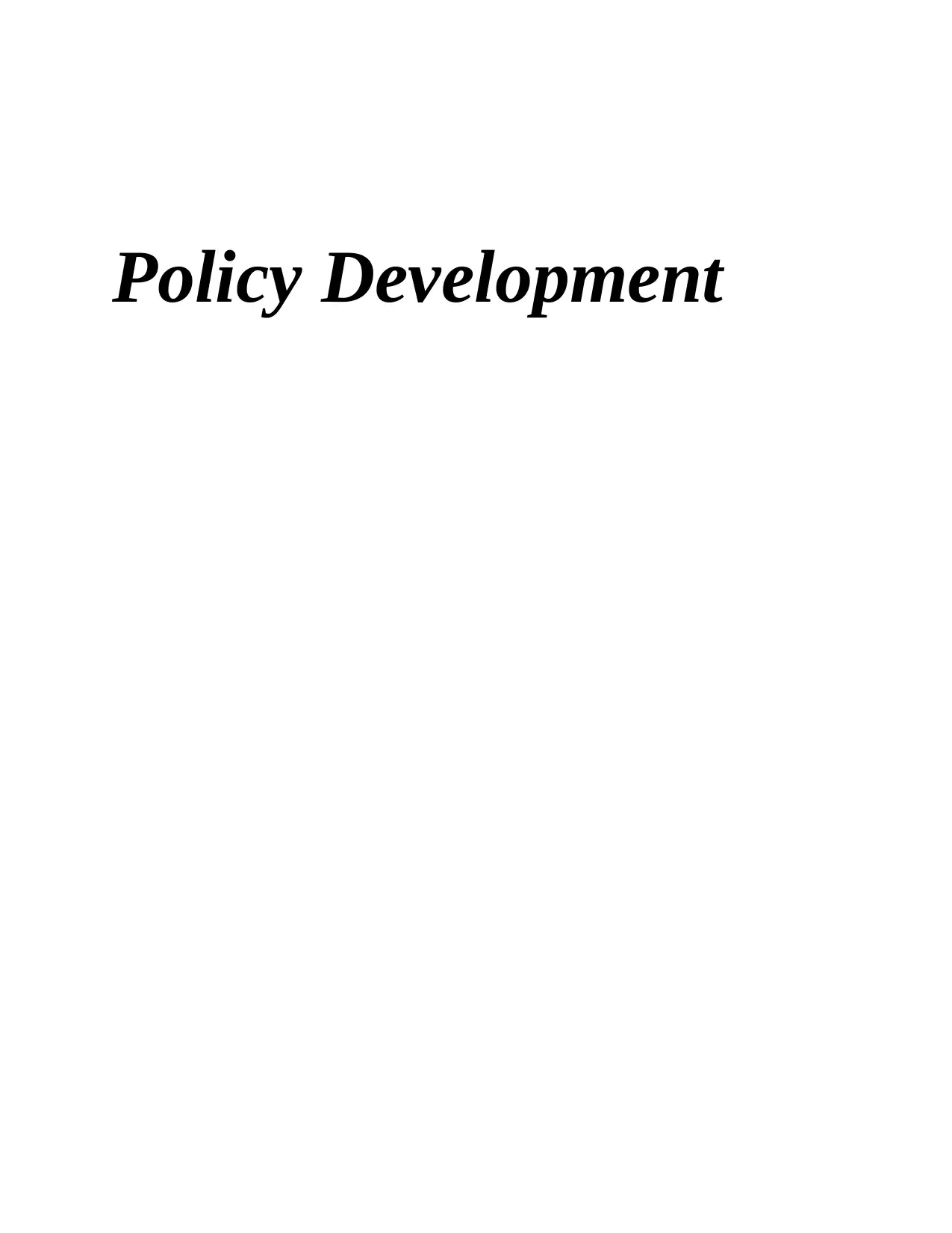
Policy Development
Paraphrase This Document
Need a fresh take? Get an instant paraphrase of this document with our AI Paraphraser
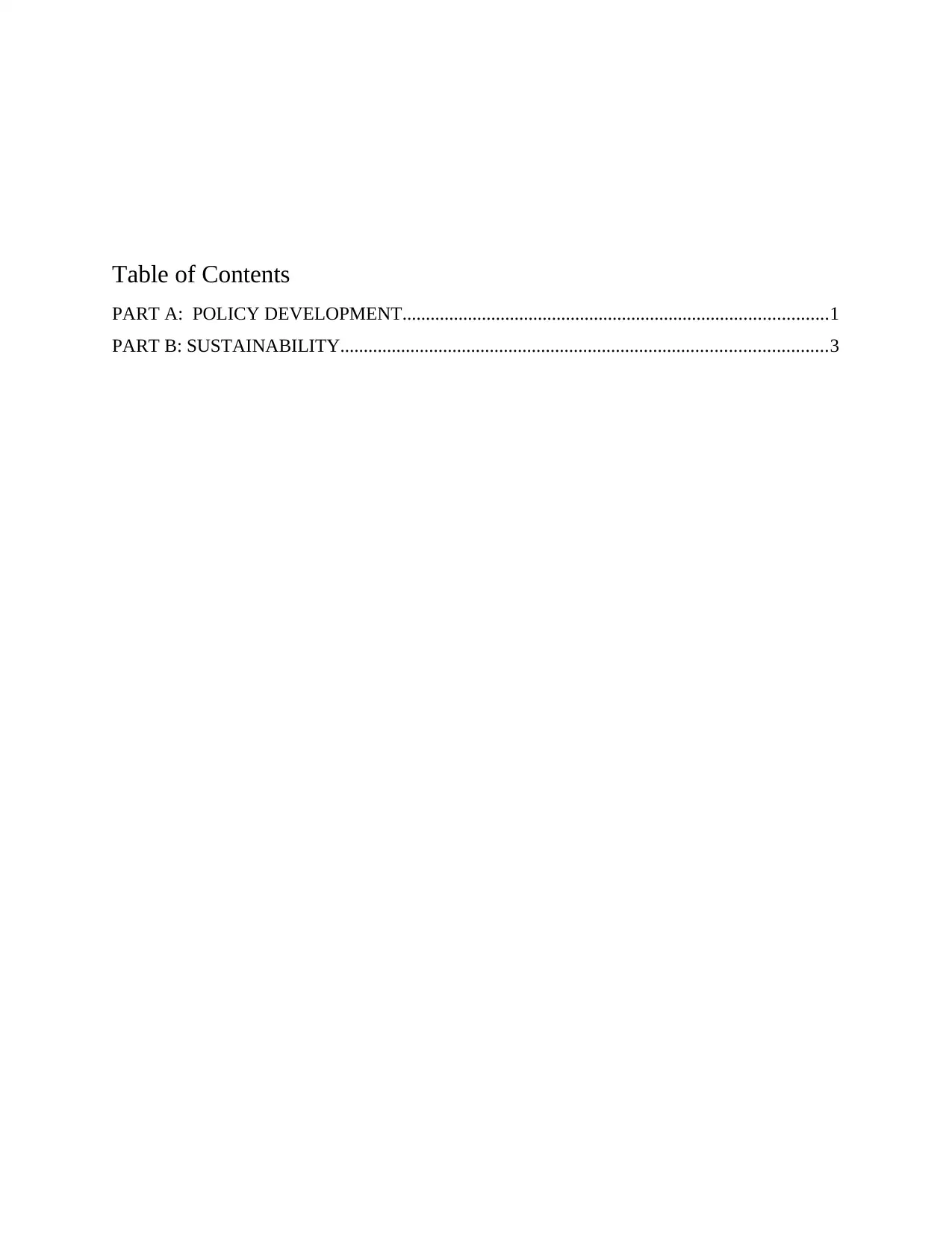
Table of Contents
PART A: POLICY DEVELOPMENT...........................................................................................1
PART B: SUSTAINABILITY........................................................................................................3
PART A: POLICY DEVELOPMENT...........................................................................................1
PART B: SUSTAINABILITY........................................................................................................3
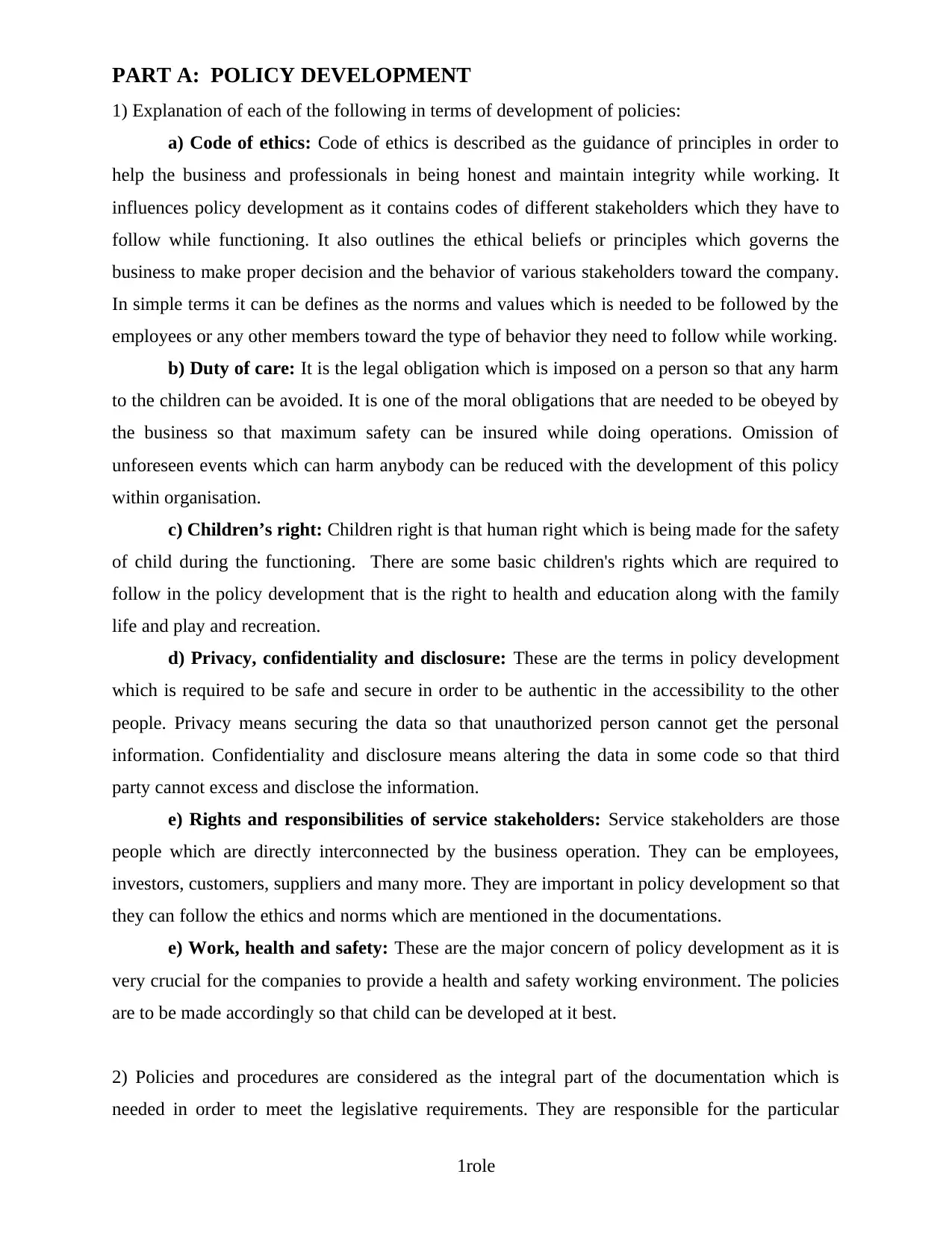
PART A: POLICY DEVELOPMENT
1) Explanation of each of the following in terms of development of policies:
a) Code of ethics: Code of ethics is described as the guidance of principles in order to
help the business and professionals in being honest and maintain integrity while working. It
influences policy development as it contains codes of different stakeholders which they have to
follow while functioning. It also outlines the ethical beliefs or principles which governs the
business to make proper decision and the behavior of various stakeholders toward the company.
In simple terms it can be defines as the norms and values which is needed to be followed by the
employees or any other members toward the type of behavior they need to follow while working.
b) Duty of care: It is the legal obligation which is imposed on a person so that any harm
to the children can be avoided. It is one of the moral obligations that are needed to be obeyed by
the business so that maximum safety can be insured while doing operations. Omission of
unforeseen events which can harm anybody can be reduced with the development of this policy
within organisation.
c) Children’s right: Children right is that human right which is being made for the safety
of child during the functioning. There are some basic children's rights which are required to
follow in the policy development that is the right to health and education along with the family
life and play and recreation.
d) Privacy, confidentiality and disclosure: These are the terms in policy development
which is required to be safe and secure in order to be authentic in the accessibility to the other
people. Privacy means securing the data so that unauthorized person cannot get the personal
information. Confidentiality and disclosure means altering the data in some code so that third
party cannot excess and disclose the information.
e) Rights and responsibilities of service stakeholders: Service stakeholders are those
people which are directly interconnected by the business operation. They can be employees,
investors, customers, suppliers and many more. They are important in policy development so that
they can follow the ethics and norms which are mentioned in the documentations.
e) Work, health and safety: These are the major concern of policy development as it is
very crucial for the companies to provide a health and safety working environment. The policies
are to be made accordingly so that child can be developed at it best.
2) Policies and procedures are considered as the integral part of the documentation which is
needed in order to meet the legislative requirements. They are responsible for the particular
1role
1) Explanation of each of the following in terms of development of policies:
a) Code of ethics: Code of ethics is described as the guidance of principles in order to
help the business and professionals in being honest and maintain integrity while working. It
influences policy development as it contains codes of different stakeholders which they have to
follow while functioning. It also outlines the ethical beliefs or principles which governs the
business to make proper decision and the behavior of various stakeholders toward the company.
In simple terms it can be defines as the norms and values which is needed to be followed by the
employees or any other members toward the type of behavior they need to follow while working.
b) Duty of care: It is the legal obligation which is imposed on a person so that any harm
to the children can be avoided. It is one of the moral obligations that are needed to be obeyed by
the business so that maximum safety can be insured while doing operations. Omission of
unforeseen events which can harm anybody can be reduced with the development of this policy
within organisation.
c) Children’s right: Children right is that human right which is being made for the safety
of child during the functioning. There are some basic children's rights which are required to
follow in the policy development that is the right to health and education along with the family
life and play and recreation.
d) Privacy, confidentiality and disclosure: These are the terms in policy development
which is required to be safe and secure in order to be authentic in the accessibility to the other
people. Privacy means securing the data so that unauthorized person cannot get the personal
information. Confidentiality and disclosure means altering the data in some code so that third
party cannot excess and disclose the information.
e) Rights and responsibilities of service stakeholders: Service stakeholders are those
people which are directly interconnected by the business operation. They can be employees,
investors, customers, suppliers and many more. They are important in policy development so that
they can follow the ethics and norms which are mentioned in the documentations.
e) Work, health and safety: These are the major concern of policy development as it is
very crucial for the companies to provide a health and safety working environment. The policies
are to be made accordingly so that child can be developed at it best.
2) Policies and procedures are considered as the integral part of the documentation which is
needed in order to meet the legislative requirements. They are responsible for the particular
1role
⊘ This is a preview!⊘
Do you want full access?
Subscribe today to unlock all pages.

Trusted by 1+ million students worldwide
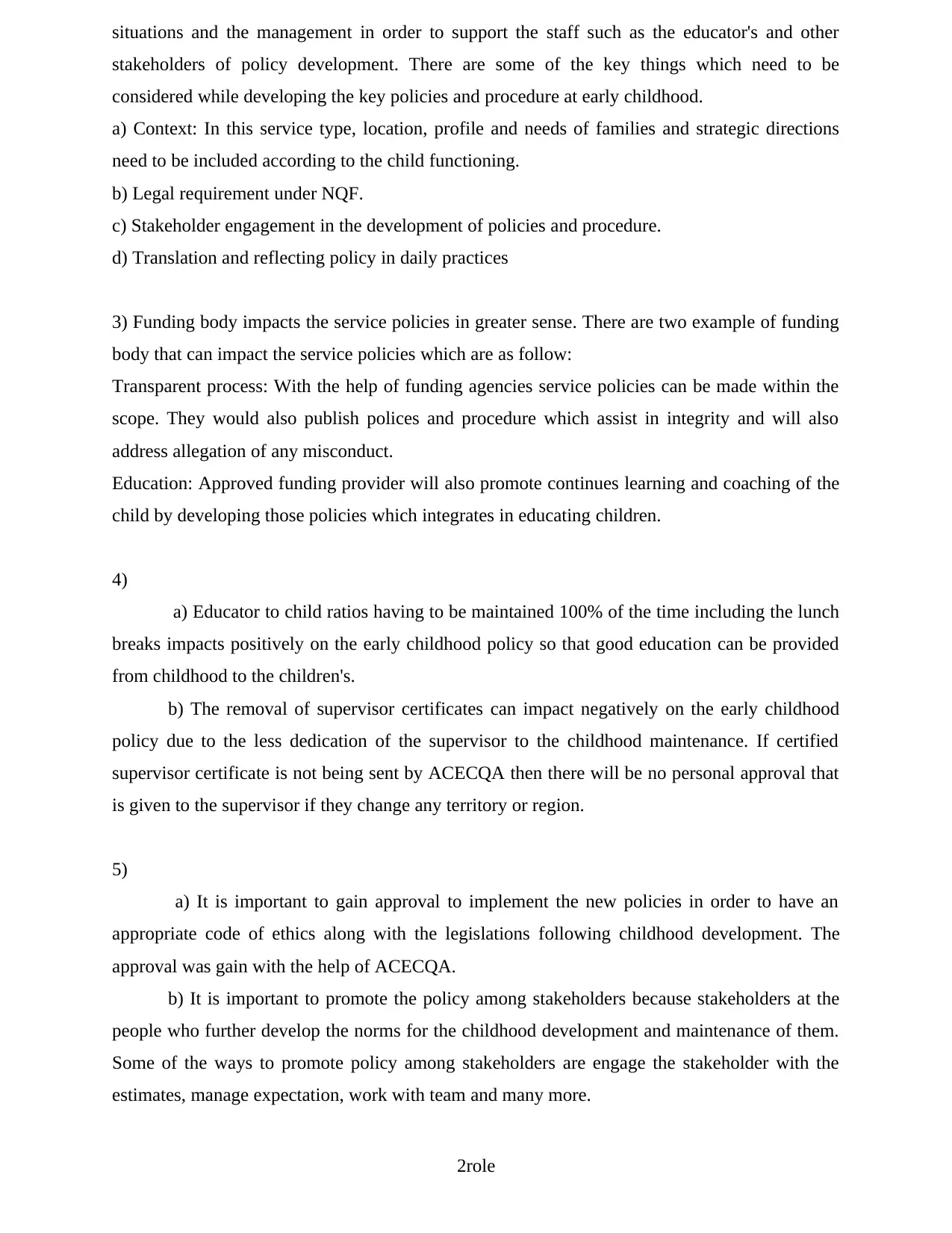
situations and the management in order to support the staff such as the educator's and other
stakeholders of policy development. There are some of the key things which need to be
considered while developing the key policies and procedure at early childhood.
a) Context: In this service type, location, profile and needs of families and strategic directions
need to be included according to the child functioning.
b) Legal requirement under NQF.
c) Stakeholder engagement in the development of policies and procedure.
d) Translation and reflecting policy in daily practices
3) Funding body impacts the service policies in greater sense. There are two example of funding
body that can impact the service policies which are as follow:
Transparent process: With the help of funding agencies service policies can be made within the
scope. They would also publish polices and procedure which assist in integrity and will also
address allegation of any misconduct.
Education: Approved funding provider will also promote continues learning and coaching of the
child by developing those policies which integrates in educating children.
4)
a) Educator to child ratios having to be maintained 100% of the time including the lunch
breaks impacts positively on the early childhood policy so that good education can be provided
from childhood to the children's.
b) The removal of supervisor certificates can impact negatively on the early childhood
policy due to the less dedication of the supervisor to the childhood maintenance. If certified
supervisor certificate is not being sent by ACECQA then there will be no personal approval that
is given to the supervisor if they change any territory or region.
5)
a) It is important to gain approval to implement the new policies in order to have an
appropriate code of ethics along with the legislations following childhood development. The
approval was gain with the help of ACECQA.
b) It is important to promote the policy among stakeholders because stakeholders at the
people who further develop the norms for the childhood development and maintenance of them.
Some of the ways to promote policy among stakeholders are engage the stakeholder with the
estimates, manage expectation, work with team and many more.
2role
stakeholders of policy development. There are some of the key things which need to be
considered while developing the key policies and procedure at early childhood.
a) Context: In this service type, location, profile and needs of families and strategic directions
need to be included according to the child functioning.
b) Legal requirement under NQF.
c) Stakeholder engagement in the development of policies and procedure.
d) Translation and reflecting policy in daily practices
3) Funding body impacts the service policies in greater sense. There are two example of funding
body that can impact the service policies which are as follow:
Transparent process: With the help of funding agencies service policies can be made within the
scope. They would also publish polices and procedure which assist in integrity and will also
address allegation of any misconduct.
Education: Approved funding provider will also promote continues learning and coaching of the
child by developing those policies which integrates in educating children.
4)
a) Educator to child ratios having to be maintained 100% of the time including the lunch
breaks impacts positively on the early childhood policy so that good education can be provided
from childhood to the children's.
b) The removal of supervisor certificates can impact negatively on the early childhood
policy due to the less dedication of the supervisor to the childhood maintenance. If certified
supervisor certificate is not being sent by ACECQA then there will be no personal approval that
is given to the supervisor if they change any territory or region.
5)
a) It is important to gain approval to implement the new policies in order to have an
appropriate code of ethics along with the legislations following childhood development. The
approval was gain with the help of ACECQA.
b) It is important to promote the policy among stakeholders because stakeholders at the
people who further develop the norms for the childhood development and maintenance of them.
Some of the ways to promote policy among stakeholders are engage the stakeholder with the
estimates, manage expectation, work with team and many more.
2role
Paraphrase This Document
Need a fresh take? Get an instant paraphrase of this document with our AI Paraphraser
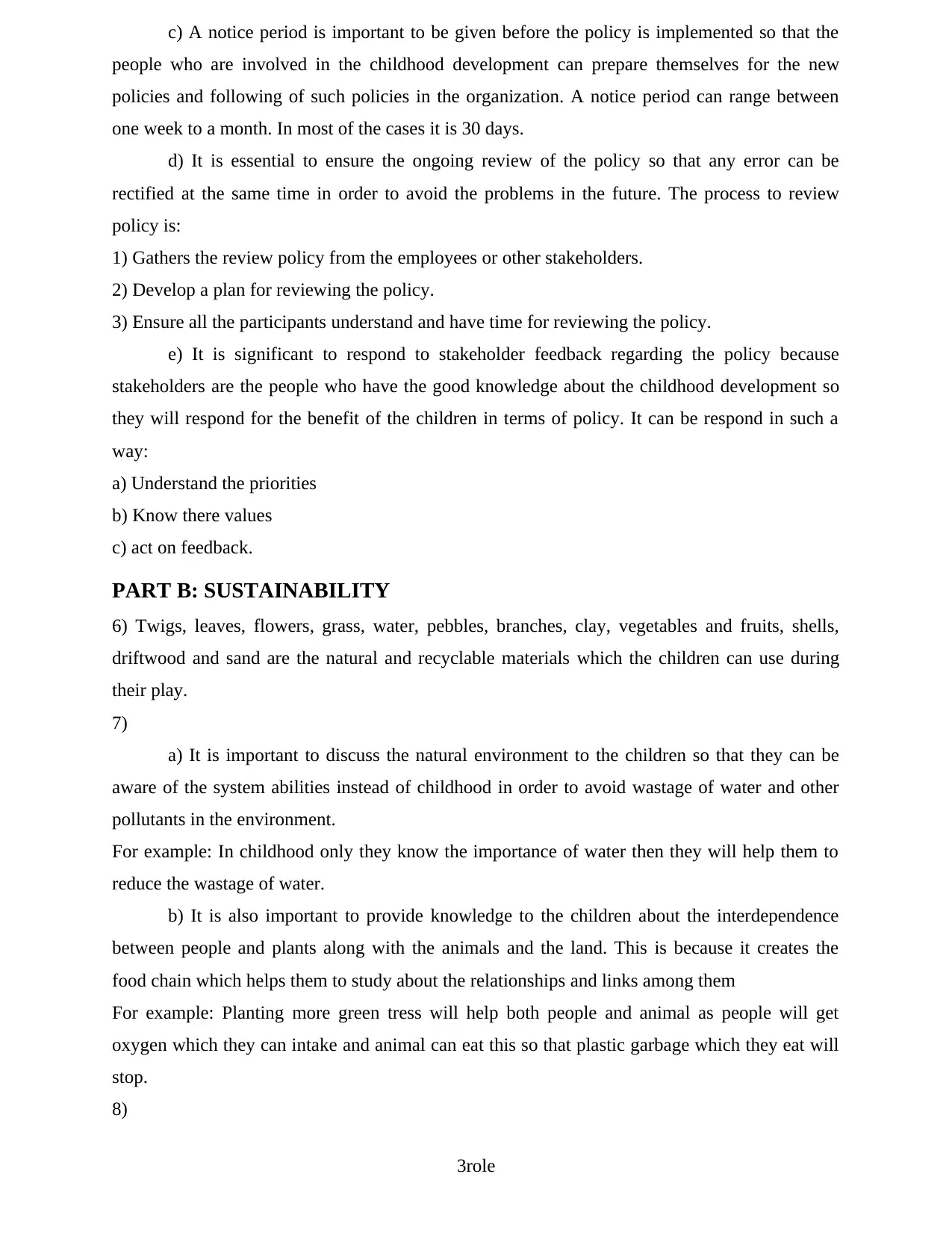
c) A notice period is important to be given before the policy is implemented so that the
people who are involved in the childhood development can prepare themselves for the new
policies and following of such policies in the organization. A notice period can range between
one week to a month. In most of the cases it is 30 days.
d) It is essential to ensure the ongoing review of the policy so that any error can be
rectified at the same time in order to avoid the problems in the future. The process to review
policy is:
1) Gathers the review policy from the employees or other stakeholders.
2) Develop a plan for reviewing the policy.
3) Ensure all the participants understand and have time for reviewing the policy.
e) It is significant to respond to stakeholder feedback regarding the policy because
stakeholders are the people who have the good knowledge about the childhood development so
they will respond for the benefit of the children in terms of policy. It can be respond in such a
way:
a) Understand the priorities
b) Know there values
c) act on feedback.
PART B: SUSTAINABILITY
6) Twigs, leaves, flowers, grass, water, pebbles, branches, clay, vegetables and fruits, shells,
driftwood and sand are the natural and recyclable materials which the children can use during
their play.
7)
a) It is important to discuss the natural environment to the children so that they can be
aware of the system abilities instead of childhood in order to avoid wastage of water and other
pollutants in the environment.
For example: In childhood only they know the importance of water then they will help them to
reduce the wastage of water.
b) It is also important to provide knowledge to the children about the interdependence
between people and plants along with the animals and the land. This is because it creates the
food chain which helps them to study about the relationships and links among them
For example: Planting more green tress will help both people and animal as people will get
oxygen which they can intake and animal can eat this so that plastic garbage which they eat will
stop.
8)
3role
people who are involved in the childhood development can prepare themselves for the new
policies and following of such policies in the organization. A notice period can range between
one week to a month. In most of the cases it is 30 days.
d) It is essential to ensure the ongoing review of the policy so that any error can be
rectified at the same time in order to avoid the problems in the future. The process to review
policy is:
1) Gathers the review policy from the employees or other stakeholders.
2) Develop a plan for reviewing the policy.
3) Ensure all the participants understand and have time for reviewing the policy.
e) It is significant to respond to stakeholder feedback regarding the policy because
stakeholders are the people who have the good knowledge about the childhood development so
they will respond for the benefit of the children in terms of policy. It can be respond in such a
way:
a) Understand the priorities
b) Know there values
c) act on feedback.
PART B: SUSTAINABILITY
6) Twigs, leaves, flowers, grass, water, pebbles, branches, clay, vegetables and fruits, shells,
driftwood and sand are the natural and recyclable materials which the children can use during
their play.
7)
a) It is important to discuss the natural environment to the children so that they can be
aware of the system abilities instead of childhood in order to avoid wastage of water and other
pollutants in the environment.
For example: In childhood only they know the importance of water then they will help them to
reduce the wastage of water.
b) It is also important to provide knowledge to the children about the interdependence
between people and plants along with the animals and the land. This is because it creates the
food chain which helps them to study about the relationships and links among them
For example: Planting more green tress will help both people and animal as people will get
oxygen which they can intake and animal can eat this so that plastic garbage which they eat will
stop.
8)
3role
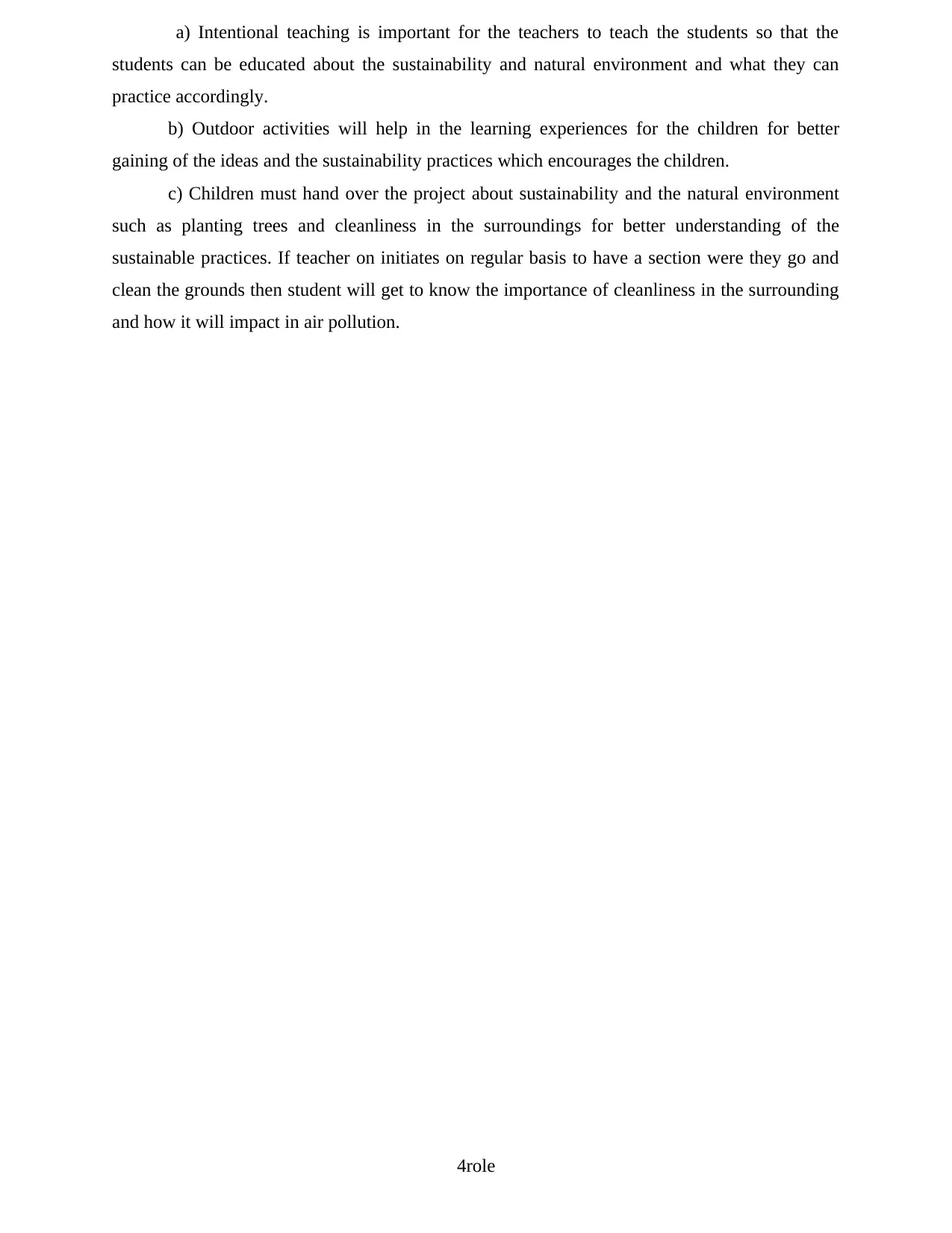
a) Intentional teaching is important for the teachers to teach the students so that the
students can be educated about the sustainability and natural environment and what they can
practice accordingly.
b) Outdoor activities will help in the learning experiences for the children for better
gaining of the ideas and the sustainability practices which encourages the children.
c) Children must hand over the project about sustainability and the natural environment
such as planting trees and cleanliness in the surroundings for better understanding of the
sustainable practices. If teacher on initiates on regular basis to have a section were they go and
clean the grounds then student will get to know the importance of cleanliness in the surrounding
and how it will impact in air pollution.
4role
students can be educated about the sustainability and natural environment and what they can
practice accordingly.
b) Outdoor activities will help in the learning experiences for the children for better
gaining of the ideas and the sustainability practices which encourages the children.
c) Children must hand over the project about sustainability and the natural environment
such as planting trees and cleanliness in the surroundings for better understanding of the
sustainable practices. If teacher on initiates on regular basis to have a section were they go and
clean the grounds then student will get to know the importance of cleanliness in the surrounding
and how it will impact in air pollution.
4role
⊘ This is a preview!⊘
Do you want full access?
Subscribe today to unlock all pages.

Trusted by 1+ million students worldwide
1 out of 6
Related Documents
Your All-in-One AI-Powered Toolkit for Academic Success.
+13062052269
info@desklib.com
Available 24*7 on WhatsApp / Email
![[object Object]](/_next/static/media/star-bottom.7253800d.svg)
Unlock your academic potential
Copyright © 2020–2026 A2Z Services. All Rights Reserved. Developed and managed by ZUCOL.





